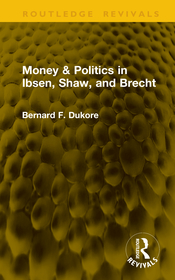
Money & Politics in Ibsen, Shaw, and Brecht
Series: Routledge Revivals;
- Publisher's listprice GBP 85.00
-
40 608 Ft (38 675 Ft + 5% VAT)
The price is estimated because at the time of ordering we do not know what conversion rates will apply to HUF / product currency when the book arrives. In case HUF is weaker, the price increases slightly, in case HUF is stronger, the price goes lower slightly.
- Discount 20% (cc. 8 122 Ft off)
- Discounted price 32 487 Ft (30 940 Ft + 5% VAT)
Subcribe now and take benefit of a favourable price.
Subscribe
40 608 Ft

Availability
Not yet published.
Why don't you give exact delivery time?
Delivery time is estimated on our previous experiences. We give estimations only, because we order from outside Hungary, and the delivery time mainly depends on how quickly the publisher supplies the book. Faster or slower deliveries both happen, but we do our best to supply as quickly as possible.
Product details:
- Edition number 1
- Publisher Routledge
- Date of Publication 1 December 2025
- ISBN 9781041147114
- Binding Hardback
- No. of pages194 pages
- Size 216x138 mm
- Language English 700
Categories
Short description:
First published in 1980, each of the three playwrights discussed in this book was a radical in his own way, concerned with the moral and social implications of capitalism. Dukore shows there is a clear chain of influence from Ibsen to Shaw to Brecht. The book is structured around the ways the three writers treat similar issues and themes.
MoreLong description:
Originally published in 1980, each of the three playwrights discussed in this lively book was a radical in his own way, concerned with the moral and social implications of capitalism. In addition, as Dukore, author of several previous books on Shaw and other modern dramatists, shows in the first chapter, there is a clear chain of influence from Ibsen to Shaw to Brecht. The book is structured around the ways the three writers treat similar issues and themes. The chapters focus on particular subjects involving money, politics, or both. They isolate particular viewpoints from which each playwright treats capitalist society. One chapter, a discussion of A Doll House, Pygmalion, and Mother Courage and Her Children, centers on money; another focuses on politics with reference to Rosmersholm, On the Rocks, and The Mother. In between fall discussions of plays in which both money and politics are central issues, first among the lower classes and women (Ghosts, Mrs Warren’s Profession, and The Good Person of Szechwan), then among professionals (The Master Builder, The Doctor’s Dilemma, Life of Galileo), then among the upper classes (Pillars of Society, Heartbreak House, Puntila and Matti), then a discussion of money and morality (An Enemy of the People, Major Barbara, and Saint Joan of the Stockyards). In his concluding essay, the author examines the relationship between ideology and artistry, showing that any interpretation of the work of these three dramatists will profit from an awareness of their radicalism.
Reviews for the original edition:
“The value of his study lies principally in the light thrown on each playwright when his work is set beside that of the other two. In this context, Ibsen appears to be more radical and Brecht less radical than are conventionally supposed. . . . the method allows each play to be analyzed in sufficient detail to highlight similarity and difference in the thought of the three playwrights.” —F. L. Radford, Nineteenth Century Theatre Research (1981)
“The principal strength of Money and Politics in Ibsen, Shaw, and Brecht is the splendid perception . . . that certain major plays of these three dramatists neatly fit together in significant groupings formed by similarities in focus, subject matter, and theme. . . . The end result is a number of effective analyses of individual plays and a renewed awareness of the extent to which these three major modern dramatists rigorously attacked existing social values and of the similarities of outlook with which they did so.” —Thomas F. Van Laan, Ibsen News & Comment (1980)
“. . . detailed and skillful analysis.” —Calvin G. Rand, Shaw: The Annual of Bernard Shaw Studies (1981)
MoreTable of Contents:
Introduction: The Apostolic Succession – Ibsen, Shaw, and Brecht. 1. “How Much?” – Money, Survival, and Independence 2. The World as Brothel – Exploiter and Exploited 3. “Special, Chosen People” – Society and the Professional Classes 4. Society’s Crumbling Foundations – Potential Destruction 5. “Scrap It” – Money and Morality 6. The Prospect of Revolution – Reactionaries, Liberals, and Radicals 7. Money and Politics in Ibsen, Shaw and Brecht. Bibliography. Index.
More




